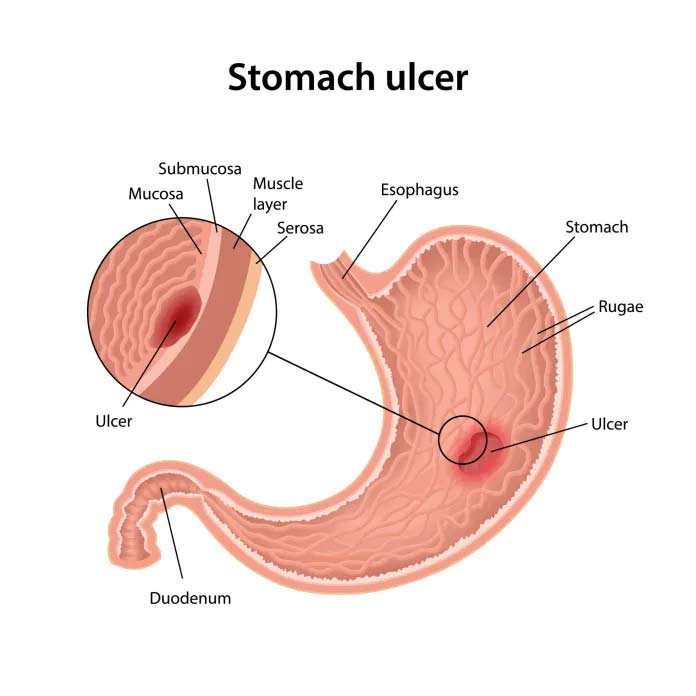Gastric Ulcer: Symptoms, Causes, Treatment
What are the symptoms of a gastric ulcer?
Gastric ulcers, also known as stomach ulcers, are sores that develop in the lining of the stomach. They can cause a variety of symptoms, including:
- Abdominal pain: The most common symptom of a gastric ulcer is a dull or burning pain in the stomach that may come and go. The pain is typically felt in the upper abdomen, between the breastbone and the navel.
- Indigestion: Gastric ulcers can cause indigestion, including feelings of fullness, bloating, and discomfort after eating.
- Nausea and vomiting: Some people with gastric ulcers may experience nausea and vomiting, particularly if the ulcer is causing obstruction or irritation.
- Loss of appetite: A gastric ulcer can lead to a loss of appetite, which may contribute to weight loss over time.
- Bloody or dark stools: In some cases, a gastric ulcer can cause bleeding in the stomach, which can lead to the passage of black, tarry stools or blood in the stool.
- Fatigue: Chronic blood loss from a gastric ulcer can lead to anemia, which can cause fatigue and weakness.
- Unexplained weight loss: Significant or unexplained weight loss may occur in some people with gastric ulcers.
It’s important to note that not everyone with a gastric ulcer will experience all of these symptoms, and some people may have no symptoms at all. If you are experiencing persistent or severe symptoms that could be related to a gastric ulcer, it’s important to consult with a healthcare provider for an accurate diagnosis and appropriate treatment.
What are the causes of a gastric ulcer?
Gastric ulcers are primarily caused by an imbalance between the factors that protect the stomach lining and those that promote erosion or damage to the lining. The most common causes of gastric ulcers include:
- Helicobacter pylori (H. pylori) infection: H. pylori is a type of bacteria that can infect the stomach lining and weaken the protective mucous layer, making the stomach more susceptible to damage from stomach acid. H. pylori infection is the most common cause of gastric ulcers.
- Nonsteroidal anti-inflammatory drugs (NSAIDs): Regular use of NSAIDs, such as aspirin, ibuprofen, and naproxen, can irritate the stomach lining and increase the risk of developing gastric ulcers. This is especially true for people who take NSAIDs frequently or at high doses.
- Excessive stomach acid production: Conditions that increase the production of stomach acid, such as Zollinger-Ellison syndrome, can increase the risk of developing gastric ulcers.
- Smoking: Smoking cigarettes or using other tobacco products can increase the risk of developing gastric ulcers and can also make them more difficult to heal.
- Alcohol use: Excessive alcohol consumption can irritate the stomach lining and increase the risk of developing gastric ulcers.
- Stress: While stress alone does not cause gastric ulcers, it can increase the production of stomach acid and make the stomach more susceptible to damage from other factors.
- Certain medications: In addition to NSAIDs, other medications, such as corticosteroids, bisphosphonates, and certain chemotherapy drugs, can increase the risk of developing gastric ulcers.
- Other medical conditions: Certain medical conditions, such as Crohn’s disease, liver disease, and kidney failure, can increase the risk of developing gastric ulcers.
It’s important to note that gastric ulcers can develop as a result of a combination of these factors, rather than a single cause. Additionally, not everyone with these risk factors will develop gastric ulcers, and other factors may also play a role in the development of the condition.
What is the treatment for a gastric ulcer?
The treatment for a gastric ulcer depends on the underlying cause of the ulcer and the severity of symptoms. Treatment may include:
- Medications:
- Proton pump inhibitors (PPIs): PPIs reduce the production of stomach acid, which helps to promote healing of the ulcer and relieve symptoms. Examples include omeprazole, lansoprazole, and esomeprazole.
- H2-receptor antagonists: These medications also reduce stomach acid production and can help promote healing. Examples include ranitidine and famotidine.
- Antibiotics: If the ulcer is caused by an H. pylori infection, a course of antibiotics may be prescribed to eradicate the bacteria. Common antibiotics used for this purpose include amoxicillin, clarithromycin, and metronidazole.
- Antacids: Over-the-counter antacids can help neutralize stomach acid and provide temporary relief from symptoms.
- Lifestyle changes:
- Avoiding NSAIDs: If NSAIDs are contributing to the development of the ulcer, it may be necessary to avoid or reduce their use.
- Quitting smoking: Smoking can interfere with the healing process and increase the risk of complications.
- Limiting alcohol intake: Excessive alcohol consumption can irritate the stomach lining and interfere with healing.
- Dietary modifications:
- Eating a healthy diet: A diet rich in fruits, vegetables, whole grains, and lean proteins can help support the healing process.
- Avoiding spicy or acidic foods: These foods can irritate the stomach lining and worsen symptoms.
- Follow-up:
- Regular follow-up with a healthcare provider is important to monitor the healing of the ulcer and make any necessary adjustments to the treatment plan.
In some cases, additional treatments may be necessary, such as surgery to repair complications of the ulcer or endoscopic therapy to stop bleeding from the ulcer. It’s important for individuals with gastric ulcers to work closely with a healthcare provider to develop a treatment plan that is tailored to their individual needs and to follow that plan closely to promote healing and reduce the risk of complications.




